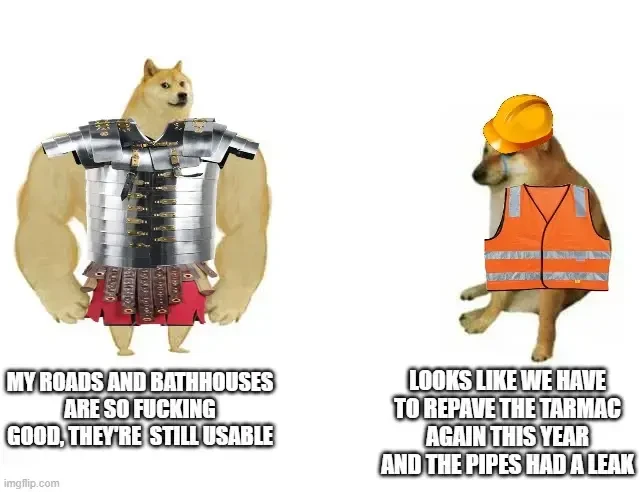this post was submitted on 13 Sep 2025
64 points (97.1% liked)
RoughRomanMemes
147 readers
24 users here now
A place to meme about the glorious ROMAN EMPIRE (and Roman Republic, and Roman Kingdom)! Byzantines tolerated! The HRE is not.
RULES:
-
No racism, sexism, homophobia, transphobia, bigotry, etc. The past may be bigoted, but we are not.
-
Memes must be Rome-related, not just the title. It can be about Rome, or using Roman aesthetics, or both, but the meme itself needs to have Roman themes.
-
Follow Piefed.social rules.
founded 3 months ago
MODERATORS
you are viewing a single comment's thread
view the rest of the comments
view the rest of the comments

I mean, the invention of wooden rail systems just for mining would have, itself, been a massive improvement in the already incredibly-OP realm of Roman industry, whose annual metal output outpaced that of all of Europe until the industrial era.
I agree that revamping the road system of the Empire would not have been on any immediate agenda, since Roman roads were largely constructed to facilitate foot traffic, not hauling.
Do we know how much tonnage a given Roman mine would actually produce per day? With soft coal, you can excavate it very fast with simple tools. I'm wondering if hauling ore and spoil out was actually not that much of a bottleneck in a typical underground mine.
I don't know that we have any numbers on coal, which was only lightly exploited in the Roman era. I think there are some estimated numbers on gold, silver, and iron mines, but it's been a while since I've read up on Roman metallurgy, tbqh.
Yes, I meant they didn't do much coal, so they wouldn't have had the problems big coal mines presented in later history.
If you have enough wood around I imagine there's not much reason to bother with the hazards, expense and relative unpleasantness of the finished product. Other ancient cultures bothered relatively little with coal too AFAIK, although I might be missing some exception.
China did some large-scale coal extraction, but they understood they could make coal into coke, which Europe didn't figure out until the ~16th century.
Even disregarding coal, though, minecart railways were extremely useful and widely used for ore extraction once they were, well, invented.
I do have to admit that I'm trying to make this fit into a conclusion, but it's a conclusion that came from quite a bit of knowledge and study into technology, both historical and modern.
Once a technology is established they do tend to be copied and used in surprising ways. The steam engine eventually replacing far more than just waterwheels has been brought up. It's that part where it goes from idea to first implementation where it gets harder - most people don't naturally want to gamble on an experiment. Building cultural institutions that allow for it anyway has been a big part of the modern history.
I'll have to look into ancient Chinese coal mining, if I can find much in English. Do you have a specific mine you're thinking of?
I'm no expert on China, but coke processing is certain from the 11th century onwards, and suggested as early as the 4th century AD
I don't understand how this is related to the idea being discussed, of the prospect of Roman mine rails being useful?
Oh, sorry. I meant, yes, they probably would have been useful in certain existing mines once they were invented, like how steam engines eventually replaced horses (and camels) along existing major routes. But, if just baskets were doing fairly well in most mines, it would explain why nobody powerful sponsored the crucial first system. And it's not the small sort of thing a clever miner could improvise on their own.
You can use charcoal for pretty much the same thing as coke, although some coke might preform better than some charcoal and vice verse, so it's interesting they mention deforestation here. I know some areas of China are still forested, but it's a big place, and they did have huge cities and a huge population all the way through.